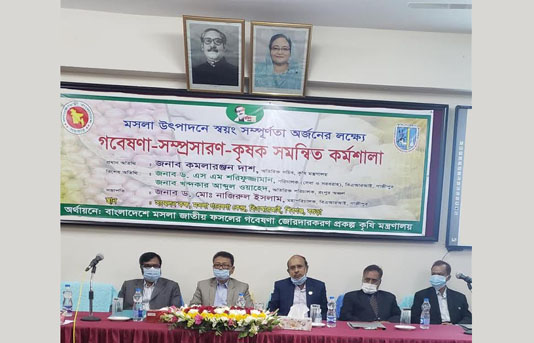BOGURA, Jan 9, 2021 (BSS) – Scientists and researchers have urged the field level agricultural extension officials and others concerned to devise ways and means on how to boost spice production locally to make the country self-reliant in spice production.
Utmost emphasis should be given on meeting up the local demands through boosting local production after the best uses of existing natural resources. All the modern technologies, knowledge and ideas along with the high yielding varieties need to be reached to the grassroots farmers.
They came up with the observation while addressing a ‘research-extension-farmers integrated workshop’ held at the conference hall of Spice Research Centre (SRC) in Shibganj Upazila of the district today.
Bangladesh Agriculture Research Institute (BARI) hosted the workshop under its ‘Strengthening of Spices Crop Research in Bangladesh Project’ discussing and devising ways and means on how to make the country self-reliant in spices production.
Additional Secretary to the Ministry of Agriculture Kamlaranjan Das addressed the workshop as chief guest, while BARI Director General Dr Nazirul Islam was in the chair.
BARI Director Dr SM Sharifuzzaman and Additional Director of the Department of Agriculture Extension Abdul Wahed spoke as special guests, while SRC Chief Scientific Officer Dr Hameem Reja welcomed the Director of the project Dr Shailendra Nath Mozumder illustrated the aims and objectives of the project besides its implementation strategy.
BARI has been implementing the Tk 94-crore research project in 194 upazilas of all 64 districts in the country.
He defined that the main goal of the project is to increase spices production through varietal improvement and technology development in spice crops in Bangladesh to reduce import and to improve livelihood to the farmers’ participants.
The project is intended to enhance agricultural research on spices with a view to increasing the production of local spices as well as developing foreign varieties in the country alongside lowering imports.
Apart from this, the project activity includes research and development on new varieties and popularizing them, producing breeding seeds, creating packages for different regions and problems, and developing quality planting materials to enhance productivity.
In his remarks, Kamlaranjan Das urged all the implementing organizations and others concerned to perform their duties with utmost sincerity and honesty for the sake of successful implementation of the project.
Around 120 agricultural extension officials, scientists, researchers and farmers from all 16 districts in Rajshahi and Rangpur divisions joined the workshop.



